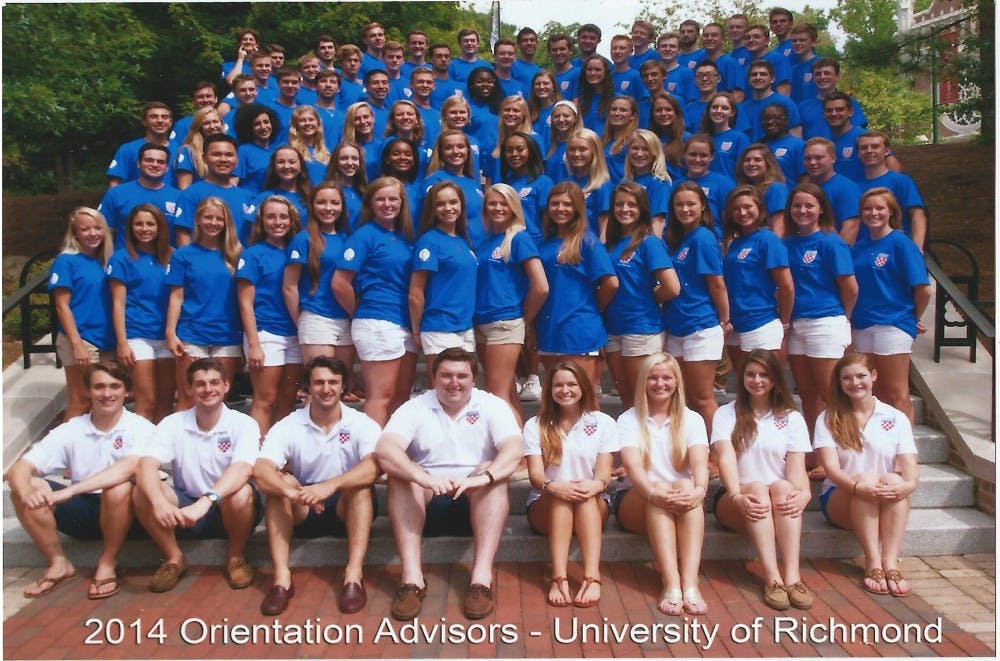This fall, all student advisers participating in University of Richmond new-student orientation programs will be compensated for the first time, Associate Dean of Westhampton College Kerry Fankhauser said.
Fankhauser, who also co-organizes and co-directs the new-student general orientation program, said student orientation advisers for the international student orientation and the Roadmap pre-semester program had been compensated in years past. Student advisers for the pre-orientation program for multicultural students and the general orientation program, however, had never been compensated.
“It’s just come to a point where it’s an equity thing,” Fankhauser said. “We have two groups of OAs being paid and two unpaid.”
The discussion around paying OAs began 10 years ago, but finding the resources to make it possible had been difficult, Fankhauser said. Although there had been no trouble in finding OAs to fill the unpaid programs, Fankhauser said she hoped that making this change would allow for a different pool of students to apply.
“We could’ve had students apply who weren’t able to in the past because they needed the extra week or so of work,” she said.
In addition to the change in compensation, there will be three students serving as general orientation chairs for first-year and transfer orientation in the fall, a change from there being just two orientation chairs in previous years.
The decision to make this change in leadership positions happened shortly after the fall 2017 orientation, Fankhauser said. In September 2017, The Collegian published an article detailing the apparent lack of diversity in new-student orientation, as well as a heated discussion between Pre-O and general orientation leaders regarding the Charlottesville, Virginia, protests that August.
In the past, Fankhauser explained, the two general orientation chairs had been selected based on holding other leadership positions within general orientation. This fall, however, there will be a third chair coming from one of the other orientation programs.
Junior Kiana Gunn will serve as one of the general orientation chairs. Gunn had a leadership position in Pre-O, Fankhauser said.
“We were trying to bring a diversity of orientation experiences into the leadership position,” Fankhauser said. “It adds a depth."
In addition to Gunn, juniors Cole Hurford and Anna Lowenthal will also serve as general orientation chairs. Both Hurford and Lowenthal previously held leadership roles in general orientation.
“I became an OA because my OA is one of my closest friends," Lowenthal said. "I don’t think that I would be on this campus without her. She has been someone who has been there to support me. Someone who I know I can turn to, and that’s exactly what I want to be.”
Enjoy what you're reading?
Signup for our newsletter
In an effort to make orientation leadership a more inclusive structure, Fankhauser said, changes were also made to the six-member team of associate chairs who help assist with general orientation. The AC application was opened more broadly to students who had served on other leadership roles on campus, not just students who had previously served as new-student orientation OAs.
“If someone had been, let’s say, an orientation adviser for international orientation, or if they had been a leader for something through the CCE or WILL*, anything like that,” Fankhauser said, “those students were then able to apply to be associate chairs.”
As a result, the selection committee received many more applications and the positions became more selective, Fankhauser said. Fankhauser said she hoped that, from these changes, orientation would feel like a more inclusive process and program.
Sophomore Nick DeMuria echoed this sentiment of inclusion. The reason the discussion between the Pre-O leaders and OAs had grown tense was not that the two groups disagreed with one another, DeMuria said, but because they had not spent enough time getting to know one another before the orientation programs began.
“Basically, we met with them once or twice and they were supposed to come in and talk with our groups about certain topics, especially the Charlottesville case,” he said. “Something that we figured out throughout the process was that wasn’t enough time. I think the multicultural OAs do a great job, and I’d really like to see them in the regular orientation process more.”
DeMuria, along with other OAs, suggested to the administration that in the future all orientation program leaders should meet and train together for at least a portion of the training. The way that multicultural Pre-O leaders and general orientation leaders are separated is weird, DeMuria said, because orientation is all about acceptance.
On April 15, a training led by UR Common Ground Director Glyn Hughes took place with OAs from all programs, according to the UR Common Ground Instagram page.
For Gunn, the several changes made to the orientation programs seem like positive steps toward making UR a more inclusive campus, she said.
“I think I was prompted to commit to the leadership position because I really want to see a change on this campus,” Gunn said. “I feel like this would be a great way to improve dialogue, but also add some sort of representation.”
Fankhauser noted that for the 10 years she had been at UR, she had seen many different aspects of student and academic life go through change. This year happens to be a season of change for orientation, she said.
Contact international editor Jocelyn Grzeszczak at jocelyn.grzeszczak@richmond.edu.
Support independent student media
You can make a tax-deductible donation by clicking the button below, which takes you to our secure PayPal account. The page is set up to receive contributions in whatever amount you designate. We look forward to using the money we raise to further our mission of providing honest and accurate information to students, faculty, staff, alumni and others in the general public.
Donate Now



